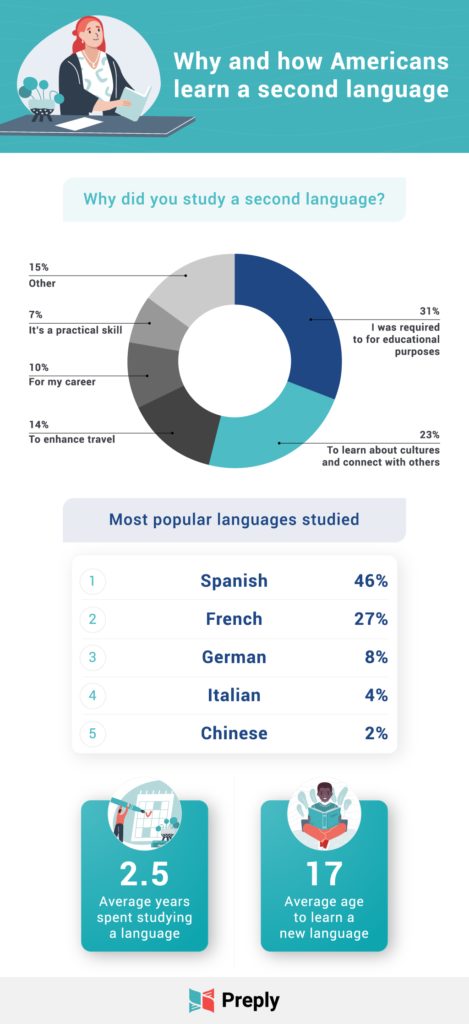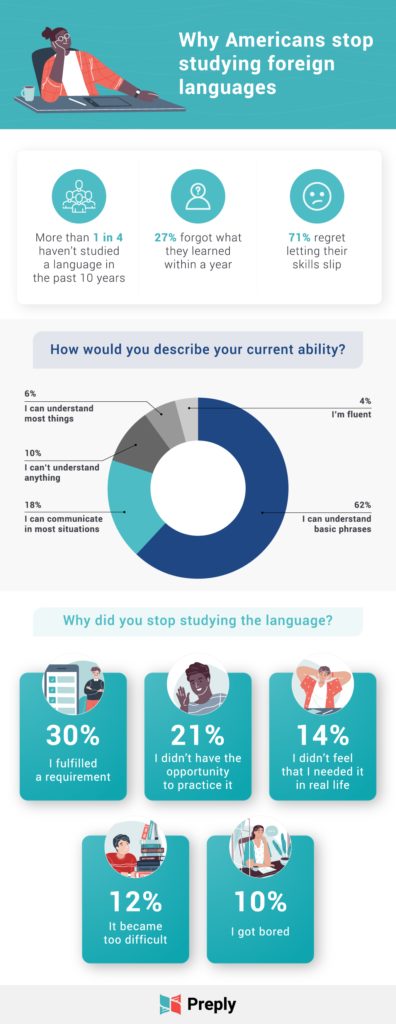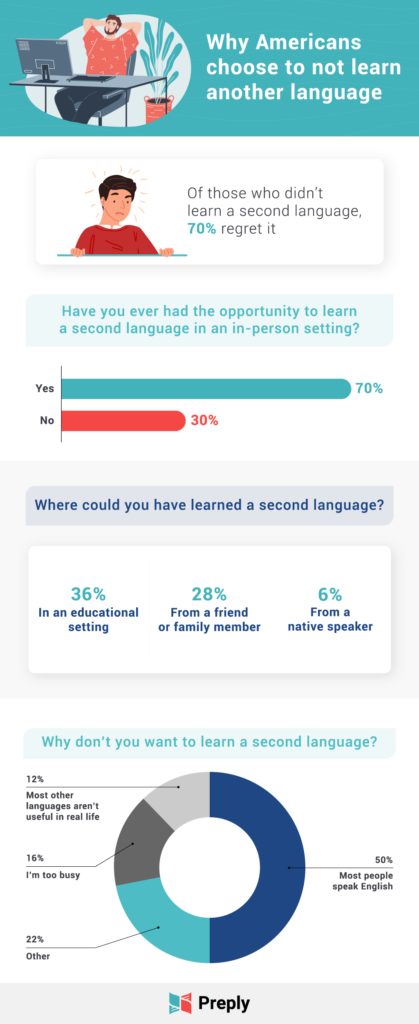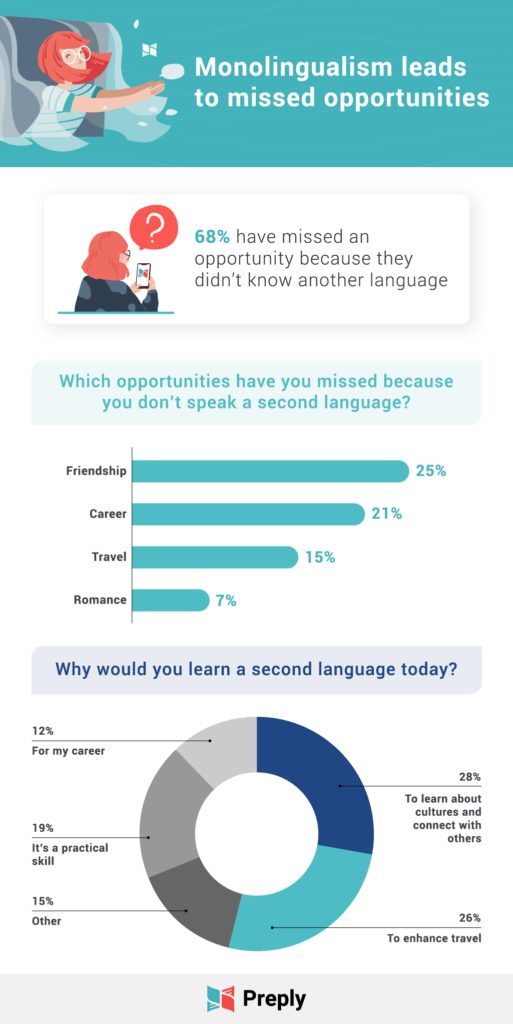Do Students Actually Continue Language After High School
Humanity is in an era of near-global connectivity. People from distinct cultures are communicating with each other every day. While English is known across the world, there are many reasons to learn additional languages . Learning a new language gives us a deeper understanding and appreciation of other cultures. Language learning also bolsters the mind. Brain health is improved through better critical thinking and memory skills.
And yet, over 30% of Americans who have studied a foreign language learned that language merely because it was required in school. And fewer than 1 in 10 studied a language to proficiency. We surveyed over 1,000 people to better understand their experiences and opinions about studying foreign languages. This study will explore the importance of language learning and why America lags so far behind the rest of the world in this area.
Key findings
- 9 out of 10 believe learning a second language is important.
- Of those who didn't learn a second language, 70% regret not doing so.
- 21% have missed a career opportunity because they didn't know a second language.
- 58% have been embarrassed by their inability to communicate with someone who spoke a different language.
How Americans learn second languages
For Americans, most language study occurs in school around the age of 17. Of those who responded to the survey, 56% learned a language in an educational setting. This is compared to 19% who learned it from a family member, and only 10% who learned from an app-based program.
This data begins to illustrate a poignant fact. Specifically, American foreign language learning is governed by educational requirements. In fact, 31% of survey respondents said they learned another language only because a school mandated it .

Of all languages our respondents studied, Spanish , French , and German were the most popular. Half of foreign language learners were educated by a teacher in school, and the average length of study was 2.5 years.
Some chose to learn outside of school mandates. About 23% of our respondents indicated that they learned a language to better understand other cultures and their languages. Education wasn't always limited to school, either. The oldest respondent was 69 when they started learning a second language. Additionally, foreign-language-speaking friends accounted for 13% of language education.
Despite the genuine desire to learn a second language exhibited by some Americans, the overall evidence highlights a gloomy trend for Americans when it comes to learning other languages. Many respondents studied a second language only because they were required to do so, and only for a relatively brief period of time. This may be due to the fact that there is less emphasis placed on language learning in the U.S. than in other parts of the world.
Second languages aren't retained
The lack of importance placed on foreign language learning in America is evident. More than 1 in 4 of those who learned a second language haven't studied it in the past 10 years. And, even at the height of their study, less than half (48%) viewed their ability as intermediate. Today, 10% of foreign language learners could no longer understand the language they studied. Nearly 40% couldn't make it through a day in the country whose language they studied using only that language.
These responses continue to illustrate the lack of emphasis placed on foreign language learning in the U.S. This thought is reinforced when looking at why language learning was stopped.

Most stopped learning after an educational requirement, like college credits, was fulfilled. Furthermore, more than 25% forgot their skills within a year . Some felt that they would never need to use it in the real world. Others simply had no opportunity to continue practicing the language. Whatever the reasons, 71% regretted losing their foreign language skills .
This leads to the following question: Why aren't Americans retaining their foreign language skills?
Why America is falling behind in foreign language learning
When we look at language providers, some answers begin to become apparent. According to the American Council of Alumni and Trustees, only 12% of America's 1,100 higher education institutions require intermediate foreign language competency for graduation. That is only three semesters of collegiate study. The Modern Language Association found another troubling statistic: that colleges lost 651 foreign language programs between 2013 and 2016.
Why is this happening?
Unlike in other countries, there are no federally mandated foreign language requirements for American students. The establishment of such requirements falls to the states themselves, but only three , plus Washington, D.C., have foreign language requirements in high school. New York and New Jersey require just one year of foreign language study to graduate; Michigan and Washington, D.C. call for two years.
Of the remaining 47 states, none have mandatory foreign language stipulations. Before entering college, only 20% of public school students have studied foreign languages . By college, this number drops to a staggering 10%.
These statistics, make it clear that America is falling behind due to a lack of state-level foreign language learning requirements. Without these requirements, Americans aren't apt to study one.
As a result, America has fallen behind other countries in terms of foreign language comprehension and intelligence. Just 1 in 5 Americans can speak another language fluently, which is far less than those in Europe, for example, more than half of whom are bilingual.
Why Americans regret not learning a second language
This study delved deeper into this lack of priority for foreign language education. Over 70% of respondents expressed regret about not learning another language . The data points to a clear lack of importance given to foreign languages across the country.

When asked, 50% of respondents said the prevalence of English speakers around the world diminishes the need to learn a second language. Some even went as far as saying that most foreign languages had no use. Others stated a lack of time and opportunity reduced their interest in learning. Most monolinguistic individuals regret not learning another language; however, many still fail to grasp the importance.
This way of thinking has consequences.
Monolinguists miss opportunities
Those who have never studied a foreign language pay in lost opportunities. A quarter of respondents missed out on friendships. And nearly 1 in 10 have let a romantic opportunity slip through their fingers.

The missed opportunities don't end there. Over 20% have been ignored for career prospects, and 15% lost travel chances. Others indicated that speaking only one language limited their depth of life. The inability to communicate with family members was a common regret amongst monolinguistic people. The difficulty of reading foreign literature was another.
These points are not lost on most respondents. Seven in 10 would like to begin studying a foreign language right now. And the reasons line up with the opportunities that they have lost. Career, culture, and travel were the most commonly reported reasons.
Respondents were most interested in learning Spanish, French, and Japanese. Interestingly, the first two are among the most popular already offered in schools, which further highlights the importance of more comprehensive language learning requirements.
The importance of learning a second language
The study bolsters this importance. More than 90% of those surveyed emphasized the importance of knowing a second language . And their reasons lined up with the opportunities that bilingualism provides. The ability for greater human connection can't be understated. 58% of respondents have suffered embarrassment because they could not connect with someone speaking another language.
Learning a second language also allows people to see more of the world: 35% missed out on their travel dreams because they couldn't communicate in other countries. Conversely, bilingual respondents indicated greater opportunities in travel and employment, especially work abroad.
The value of learning a second language is clear: bilingual individuals have richer lives. But one doesn't need to be a polyglot to reap the rewards of improved language skills. Learning another language provides benefits across many areas of a person's journey.

We have online tutors in more than 50 languages.
Preply is one of the leading educational platforms that provide 1-on-1 lessons with certified tutors via the exclusive video chat.
- Find my online tutor now
There is no reason not to start learning another language. Bilingual respondents to this study pointed to several effective methods of learning. Talking with native speakers was a practical means to learn another language. Traveling the world also aided language learning through cultural immersion.
However, learning another language doesn't require anyone to leave their home. Interactive language applications and lessons with teachers and tutors on platforms such as Preply can help anybody learn language skills. No matter how one learns, the key to studying a foreign language is straightforward: find a fun method. With so many benefits and so much to gain, it's evident that now is the perfect time for Americans to start studying another language.
Methodology:
On August 11, 2021, we surveyed 1,078 people about their experience studying a foreign language via the Amazon Mechanical Turk platform. Of respondents, 58% were male, 41% were female, and 1% were nonbinary. The average age was 37. When it comes to education, 10% had completed high school or less; 20% completed some college; 51% graduated college; 20% had completed some graduate work or had earned a graduate degree.
garretsontwoun1957.blogspot.com
Source: https://preply.com/en/blog/americans-foreign-language-survey/
0 Response to "Do Students Actually Continue Language After High School"
Post a Comment